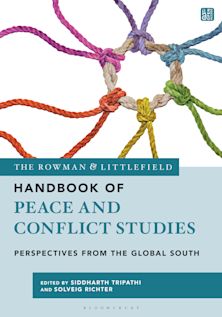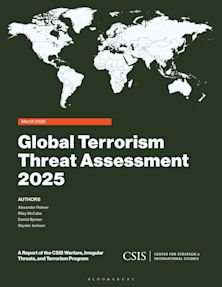- Home
- ACADEMIC
- Politics & International Relations
- Security and Strategic Studies
- Methods of Inquiry for Intelligence Analysis
Inspection copy added to basket
This title is available for inspection copy requests.
Please note our inspection copies are only available in ebook format, and are fulfilled by VitalSource™. If an ebook isn’t available, please visit our inspection copy page for more information.
Buy from Bloomsbury eTextBooks
You are now leaving the Bloomsbury Publishing website. Your eBook purchase will be with our partner https://www.vitalsource.com.
Your credit card statement will show this purchase originating from VitalSource Technologies. They will also provide any technical assistance you might require.
You must sign in to add this item to your wishlist. Please sign in or create an account
Description
Few professions have experienced change to the same extent as has intelligence. Since the 9/11 attacks, the role of intelligence has continued to grow, and its mission remains complex. Government and private security agencies are recruiting intelligence analysts in ever higher numbers to process what has become a voluminous amount of raw information and data. Methods of Inquiry for Intelligence Analysis offers students the means of gaining the analytic skills essential to undertake intelligence work, and the understanding of how intelligence fits into the larger research framework. It covers not only the essentials of applied research, but also the function, structure, and operational methods specifically involved in intelligence work.
Table of Contents
, Intelligence Theory
,
Chapter 2
, Intelligence Organizational Structures
,
Chapter 3
, The Intelligence Research Process
,
Chapter 4
, Clandestine and Covert Sources of Information
,
Chapter 5
, Open Sources of Information
,
Chapter 6
, Qualitative Analytics
,
Chapter 7
, Quantitative Analytics
,
Chapter 8
, Geointelligence
,
Chapter 9
, Target Profiles
,
Chapter 10
, Operational Assessments
,
Chapter 11
, Vehicle Route Security Report
,
Chapter 12
, Threat Assessments
,
Chapter 13
, Vulnerability Assessments
,
Chapter 14
, Risk Assessments
,
Chapter 15
, National Security Policy Assessments
,
Chapter 16
, Appendix—Critical Values of Chi-Square Distribution
,
Chapter 17
, About the Author
,
Chapter 18
, Index
,
Product details
| Published | 12 Apr 2019 |
|---|---|
| Format | Ebook (Epub & Mobi) |
| Edition | 3rd |
| Extent | 248 |
| ISBN | 9781538125885 |
| Imprint | Rowman & Littlefield |
| Illustrations | 18 b/w photos; 33 tables; 15 graphs; 15 textboxes |
| Series | Security and Professional Intelligence Education Series |
| Publisher | Bloomsbury Publishing |
About the contributors
Reviews
-
A text for academics, students, and practitioners who are interested in understanding the changes taking affect in the area of intelligence and in the role of analysts.
Garth den Heyer, Arizona State University
-
Methods of Inquiry for Intelligence Analysis presents a strong discussion of the subject from a perspective grounded in the scientific method, while providing a comprehensive and well-organized overview of how various intelligence products are developed and disseminated.
Mark Feulner, Florida State University
-
Having examples of the types of analysis makes the book extremely strong and useful in the classroom; students need to see concrete examples of theories in practice.
Ken Stiles, Virginia Tech



































